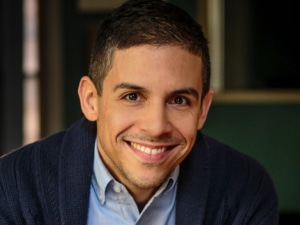DCPA NEWS CENTER
Enjoy the best stories and perspectives from the theatre world today.
Enjoy the best stories and perspectives from the theatre world today.
This article was published on December 10, 2014
When Matthew Lopez visited Denver School of the Arts students last month, he didn’t waste any time. He worked them.

Matthew Lopez
Lopez, the accomplished young playwright of both The Legend of Georgia McBride and The Whipping Man, is serving as the DCPA Theatre Company’s first-ever Playwriting Fellow. Lopez is making monthly visits to Denver throughout the season, and he wants connecting with area students to be a regular priority.
“One of the reasons it is important for me to work with students is because one day someone said to me, ‘You are good at what you do,’ ” Lopez said. “And I trusted them. Those encouragements are something you cling to when things are really hard.”
Denver School of the Arts is a Denver Public Schools magnet school where students declare specific majors such as theatre, creative writing or visual arts, just as if they were in college.
Lopez’s visit caused a bit of a stir. His first stop was before a full class of acting students. And just as he was starting, he was asked if a nearby class could join in. Soon every chair and nearly every floor tile was covered in teenaged sponges.
For those who didn’t already know Lopez, they soon learned why they should listen to him. Georgia McBride had its world premiere at the DCPA earlier this year, and The Whipping Man was one of the most produced plays in America (including Curious Theatre). He has two new plays debuting in 2015; he wrote for one season of HBO’s The Newsroom; and he is readying his first screenplay, for the company that produced the Oscar-winning Twelve Years a Slave.
Then the work began. Lopez invited a few brave acting students to read speeches from his upcoming plays, meaning the material would not only be cold to them – it would be tundra. They couldn’t know what they were signing up to read.
One student played a dreamer imagining his Oscar acceptance speech for his work as an extra on the 1959 filming of West Side Story. Another had a woman trying to articulate her feelings to a potential new boyfriend. And with Lopez’s gentle assistance – no doubt shaped by having two teachers for parents and an aunt who has won a Tony Award – he elucidated how to inspect a playwright’s text for clues they can latch onto and help them figure out the writer’s intention.
“What we are going to be paying attention to is the language,” Lopez said. “Our goal will be to look at the text and make it come alive.”
When another student sped through a passage too quickly, Lopez encouraged her to try again. “Say that sentence again … and really understand it,” he said.
The student playing the imaginary Oscar winner embraced the sweet naiveté of a young man who thinks an extra might actually be considered for an Academy Award. Oh, and another thing – in his fantasy, he is married to Marilyn Monroe, and the father of her four children. The student took on the challenge of communicating all of that in a brief speech with comic gusto:
“I didn’t really expect to win this. I mean, when you are up against Marlon Brando, Paul Newman, David Niven and Laurence Olivier, well … wow.”
Lopez stopped him. “OK, here’s a tip: Never waste a ‘wow,’ If a playwright gives you the word ‘wow,’ he really wants you to say the word, WOW!”
He tried again. He hit the “WOW.” His fellow students cheered for the difference.
Lopez told them the scene was partially inspired by being the nephew of Priscilla Lopez, who created the role of Diana in the original Broadway production of A Chorus Line, and won the Tony Award in 1980 for her performance in A Day in Hollywood / A Night in the Ukraine.
“When I would visit her as a kid, I would take her Tony Award off the mantle and go into the bathroom and make imaginary acceptance speeches,” he said to knowing laughs.
Lopez advised the young actors to jump in should they ever get the opportunity to work with a playwright on a developing play. It is a much different creative experience than being handed a published script that will not change. A developing play is different, he said, because you are a part of shaping the developing script.
“Working with new plays is a whole different kind of electrical charge,” Lopez told them. “For me, that’s why I love working in theatre. Because you don’t know what is going to happen next. A play like Fences, you already know. You can either get it right, or you can get it wrong. But it’s done. It’s not changing. But when you work on a new play, there are so many moving parts and variables, and every day the writer is constantly changing your words. It’s a different kind of acting challenge, and you should always take it.”
The afternoon had Lopez visiting with a very different group of creative-writing majors. He told them to appreciate the blessing the Denver School of the Arts is in their lives.
“My life is pretty great right now,” said Lopez, who grew up in the Florida panhandle. “But I may have saved a lot of money in therapy if I had a school like this growing up.”
MATTHEW LOPEZ’S TIPS FOR YOUNG ACTORS
MATTHEW LOPEZ’S TIPS FOR YOUNG WRITERS

Leave a Reply
Want to join the discussion?Feel free to contribute!